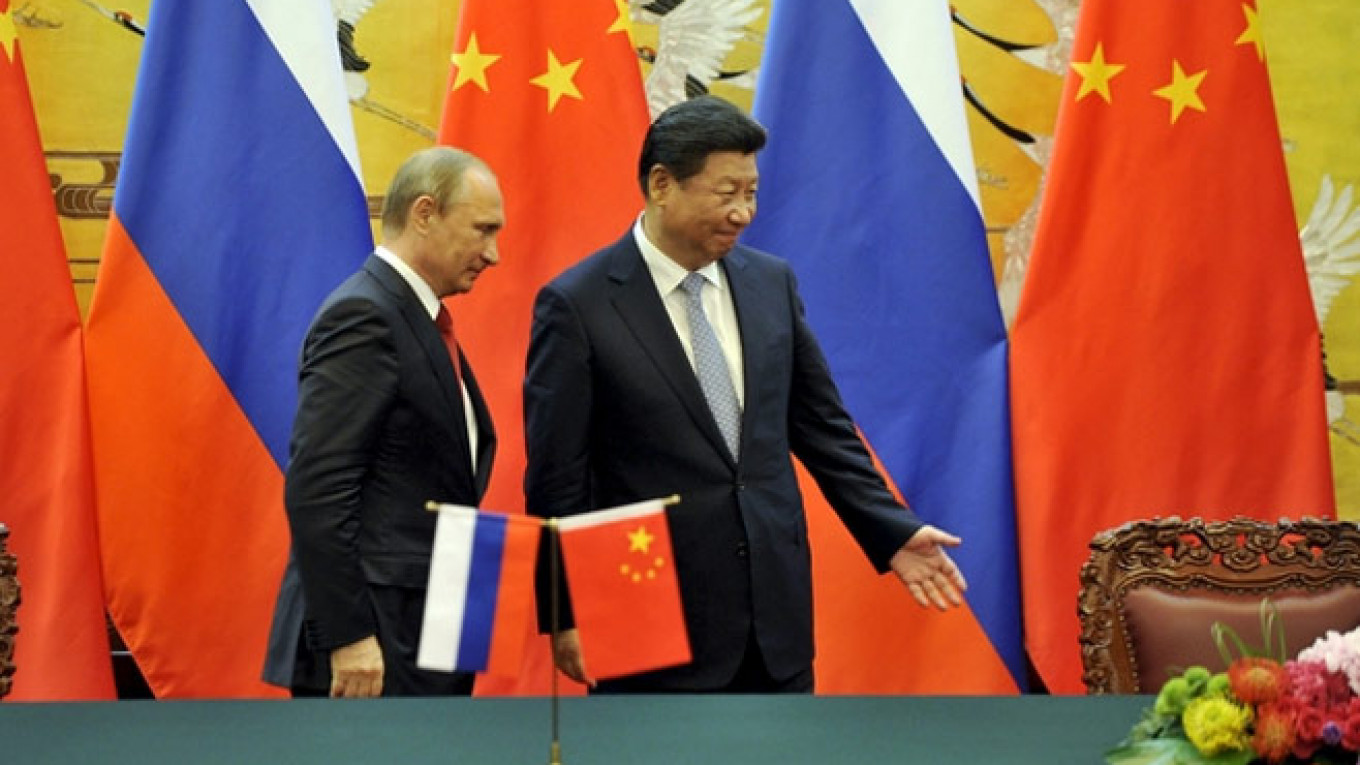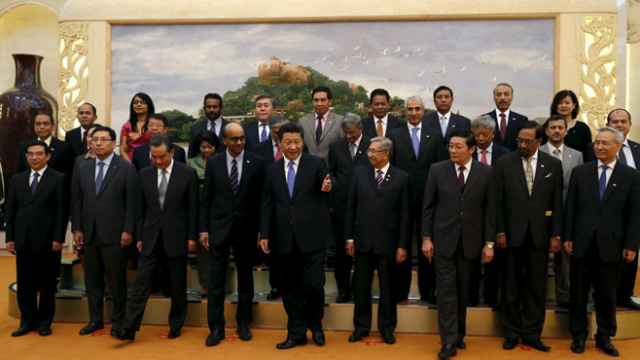After a year of intense flirtation, the Chinese-Russian relationship is beginning to look like a one-sided love affair.
Increasingly cut off from Western markets after the imposition of sanctions, Russian leaders initially pinned their economic hopes on a pivot eastward. Russians thought that Beijing would jump at the chance to buy deposits, flood Russia with cheap financing, and hand over essential technologies.
However, Moscow's expectations of greater engagement with Beijing have gone unfulfilled: The volume of trade and investment between the two nations has dwindled as a result of falling natural resource prices, sanctions, ruble volatility, and the Russian economic crisis.
In 2011, then presidents Dmitry Medvedev and Hu Jintao announced goals of achieving $100 billion in bilateral trade by 2015 and $200 billion by 2020; initially, these targets seemed attainable. According to a memo based on data from Chinese customs agencies released by Russia's Economic Development Ministry, between 2003 and 2012, trade between the two countries grew at an average of 26.4 percent per year.
Over the first six months of 2015, however, Russia's trade with China dropped by a whopping 31.4 percent, to $31 billion.
One obvious reason for the plunge in trade is the downturn in natural resource prices, particularly oil. Fossil fuels account for 61.4 percent of Russian exports to China. However, natural resource price dynamics are not the only factor in Russia's decreasing stake in the Chinese economy.
The overall downturn in the Russian economy is taking a toll. The Economic Development Ministry forecasts a gross domestic product drop of 3.3 percent in 2015, which helps explain why Russia imported 36.2 percent fewer Chinese goods in the first half of the year.
When Medvedev and Hu announced their bilateral trade goals, Russian hydrocarbons were expected to fuel most of the growth. The Chinese economy was racing ahead with double-digit GDP growth, oil prices were soaring, and the Skovorodino-Mohe spur to the Eastern Siberia-Pacific Ocean oil pipeline was complete, so these goals seemed achievable.
Agreements reached last year by Gazprom and China's CNPC on the construction of the Power of Siberia pipeline — which was projected to be worth $400 billion — seemed like the logical next step. Next on the agenda were the Altai pipeline; a new above-ground pipeline from Khabarovsk or Vladivostok; and Novatek's Yamal LNG project, in which CNPC planned to increase its stake from 20 to 30 percent.
But collapsed hydrocarbon prices, decreased Chinese demand, and sanctions have pulled the rug out from under these projects: talks on the Altai pipeline have been suspended; Chinese investment in Yamal LNG may not come to fruition; and in February 2015, CNPC scaled back its forecast for Chinese demand for gas in 2020 from 400 billion cubic meters to 310 billion cubic meters.
The recovery and growth of Russian-Chinese trade will depend above all on the price of Brent crude, as the overall state of the Russian economy and the ruble exchange rate are both closely tied to oil prices. The willingness of Russian officials to substantially improve the investment climate and to create stable conditions for Chinese investment will also affect trade. Finally, the cancellation or relaxation of sanctions would affect bilateral trade, though there is no reason to expect this anytime soon.
In the current climate, Moscow and Beijing will likely focus on strategic projects. One promising sphere is military-technical cooperation: Several Russian experts, including Vasily Kashin from the Center for Analysis of Strategies and Technologies, believe that Russia currently has a "window of opportunity" to sell certain systems that China will probably learn to produce on its own in a few years.
Another field of interest is infrastructure on Russian territory as part of the countries' mega-project to link the Eurasian Economic Union with the Silk Road Economic Belt. So far, Moscow and Beijing have discussed several infrastructure projects, including a high-speed railroad between Moscow and Kazan, and a highway from Kazakhstan to Europe. However, these projects will not deliver quick results, and will first require extensive negotiations over their terms.
Alexander Gabuev is a senior associate and chair of the Russia in the Asia-Pacific Program at the Moscow Carnegie Center. This is an abridged version of a comment that appeared on Carnegie's Eurasia Outlook blog.
See also on the Eurasia Outlook blog:
Just an Oil Company? The True Extent of Russia’s Dependency on Oil and Gas
Supporting a War that isn't: Russian Public Opinion and the Ukraine Conflict
A Message from The Moscow Times:
Dear readers,
We are facing unprecedented challenges. Russia's Prosecutor General's Office has designated The Moscow Times as an "undesirable" organization, criminalizing our work and putting our staff at risk of prosecution. This follows our earlier unjust labeling as a "foreign agent."
These actions are direct attempts to silence independent journalism in Russia. The authorities claim our work "discredits the decisions of the Russian leadership." We see things differently: we strive to provide accurate, unbiased reporting on Russia.
We, the journalists of The Moscow Times, refuse to be silenced. But to continue our work, we need your help.
Your support, no matter how small, makes a world of difference. If you can, please support us monthly starting from just $2. It's quick to set up, and every contribution makes a significant impact.
By supporting The Moscow Times, you're defending open, independent journalism in the face of repression. Thank you for standing with us.
Remind me later.








